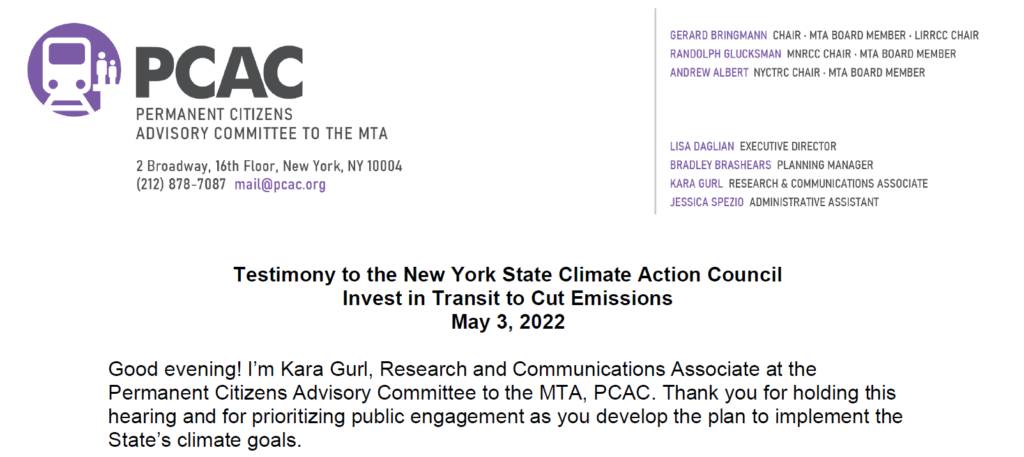Good evening! I’m Kara Gurl, Research and Communications Associate at the Permanent Citizens Advisory Committee to the MTA, PCAC. Thank you for holding this hearing and for prioritizing public engagement as you develop the plan to implement the State’s climate goals.
On Earth Day, MTA Chair Janno Lieber noted, “Transit is the antidote to climate change.” Earth Day should be every day, so as you develop your plans, public transit must be central to the state’s emission reduction goals. To help reach the goal of cutting greenhouse gas emissions 40 percent by 2030 and at least 85 percent by 2050, reducing dependency on cars ‒ the source of a large portion of emissions ‒ is key. Investing in transit is the best way to do that. Drivers must be able to depend on trains and buses to get them where they need to go.
The state is seeing an unprecedented influx of federal funding for infrastructure and transportation—along with unprecedented flexibility that allows them to “flex” federal highway funds for transit improvements. We urge you to prioritize using those funds for improving and enhancing transit, instead of expanding highways and car dependency.
Buses should be a major part of the state’s climate plans. We saw during Hurricane Ida that even when our subways flooded and failed, buses were a lifeline for tens of thousands of riders. Buses are also a flexible and more affordable option for expanding service around the region, helping reduce car dependency by bringing transit to the communities that don’t currently have equitable access. Electric buses are key to reducing emissions, and the MTA is making great progress in electrifying its bus fleet across the five boroughs.
Most importantly, we hope that you will prioritize increased funding for transit operations around the state as a key step towards achieving our climate goals. Here in the city and throughout the region, the MTA is already one of the greatest tools in the state’s emissions reduction toolbox. But the MTA can’t expand its service, ridership, or reliability without increased long-term, sustainable funding from the state. Solving the climate crisis won’t be easy, but investing in transit is one of the single most important decisions the state can make in helping our communities become more sustainable and resilient. Thank you.
